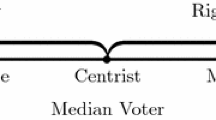Abstract
This paper develops a model to explain candidates' strategic decisions to provide or withhold information about policy positions in the course of an election campaign. The analysis treats this problem as a game of imperfect information. Attention is focused on modeling voter suspicion of candidates whose positions are ambiguous. Specific numerical examples illustrate that candidate decisions about providing information via informative advertising depend upon candidate policy preferences, campaign fund endowments, partisan reputations, and incumbency status. The model also provides theoretical underpinnings for empirical findings regarding the effects of campaign advertising.
Similar content being viewed by others
References
Alesina, A. and Cukierman, A. (1990). The politics of ambiguity.Quarterly Journal of Economics 105: 829–850.
Bernhardt, M.D. and Ingberman, D.E. (1985). Candidate reputations and the incumbency effect.Journal of Public Economics 27: 47–68.
Budge, I. and Hofferbert, H.I. (1990). Mandates and policy outputs: U.S. party platforms and federal expenditures.American Political Science Review 84: 111–131.
Chappell, H.W. and Keech, W.R. (1986). Policy motivation and party differences in a dynamic spatial model of party competition.American Political Science Review 80: 881–899.
Downs, A. (1957).An economic theory of democracy. New York: Harper.
Fishel, J. (1985).Presidents and promises. Washington, DC: CQ Press.
Glazer, A. (1989). The electoral costs of special interest politics when voters are ignorant.Economics and Politics 3: 225–238.
Glazer, A. (1990a). The strategy of candidate ambiguity.American Political Science Review 84: 237–241.
Glazer, A. (1990b). Voting and campaigning under imperfect information.European Journal of Political Economy 6: 89–98.
Harrington, J.E. (1992). The revelation of information through the political process: An exploratory analysis.Economics and Politics 4: 255–276.
Jacobson, G.C. (1978). The effects of campaign spending in congressional elections.American Political Science Review 72: 469–491.
Jacobson, G.C. (1985). Money and votes reconsidered: Congressional elections, 1972–1982.Public Choice 46: 17–62.
McKelvey, R.D. and Ordeshook, P.C. (1985). Elections with limited information: A fulfilled expectations model using contemporaneous poll and endorsement data as information sources.Journal of Economic Theory 36: 55–85.
Ordeshook, P.C. (1986).Game theory and political theory. New York: Cambridge, University Press.
Page, B.I. (1976). The theory of political ambiguity.American Political Science Review 70: 742–752.
Page, B.I. (1978).Choices and echoes in presidential elections: Rational man and electoral democracy. Chicago: University of Chicago Press.
Rasmussen, F. (1989).Games and information. Cambridge: Basil Blackwell.
Selten, R. (1975). Reexamination of the perfectness concept for equilibrium points in extensive games.International Journal of Game Theory 4: 25–55.
Shepsle, K. (1972). The strategy of ambiguity.American Political Science Review 66: 555–568.
Wittman, D.A. (1983). Candidate motivation: A synthesis of alternative theories.American Political Science Review 77: 142–157.
Author information
Authors and Affiliations
Additional information
John Chilton, George Chressanthis, Thomas Cooper, Joseph Harrington, William Keech, Timothy McKeown, and Robert Reid provided helpful and appreciated comments on earlier drafts of this paper. I also acknowledge the research assistance of Joilson Dias, Rob McGregor, and Paulino Teixeira.
Rights and permissions
About this article
Cite this article
Chappell, H.W. Campaign advertising and political ambiguity. Public Choice 79, 281–303 (1994). https://doi.org/10.1007/BF01047774
Accepted:
Issue Date:
DOI: https://doi.org/10.1007/BF01047774




